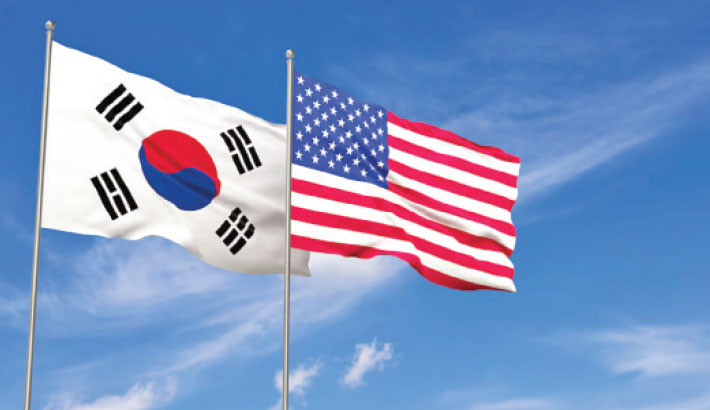
South Korea and the United States shared on Friday details of their trade and security deal struck in late October after months of tense negotiations between the two allies.
The agreement, finalised after US President Donald Trump met his South Korean counterpart Lee Jae Myung, includes investment promises by Seoul and tariff cuts by the United States.
Here is a breakdown of the deal, according to a memo released by both governments.
The United States will maintain levies of up to 15 % on South Korean imports, including vehicles, car parts and pharmaceuticals, according to the joint fact sheet released by the White House.
This makes US tariffs on South Korean cars lower than the current rate of 25 %, but still far above a previous rate of 2.5 % under an existing free trade agreement.
The auto industry accounts for 27 % of South Korea’s exports to the United States, which takes in nearly half of the country’s car exports.
On semiconductors, the joint memo says Washington “intends to provide terms... that are no less favourable” than those offered to other major trade partners.
South Korea is home to Samsung Electronics and SK hynix and produces a significant chunk of high-end chips that have become the lifeblood of the global economy, powering everything from smartphones to missiles. US tariffs on certain products, including generic drugs, aircraft and aircraft parts, will be abolished.
Seoul will eliminate its 50,000-unit cap on US car imports allowed without modifications each year, and “will work together with the United States to address non-tariff barriers affecting trade in food and agricultural products”.
In late July, Trump announced he would reduce tariffs on South Korean imports in exchange for a commitment from Seoul to invest $350 billion in the United States and boost its purchases of American energy.
The terms of these proposed investments had been the subject of complex negotiations, in which Seoul argued it was unable to spend so much money at once, fearing such a move might tank the South Korean currency. Seoul has eventually agreed to spend $150 billion in shipbuilding cooperation, and $200 billion in direct investment in sectors deemed “strategic” such as semiconductors, biotechnology and energy by January 2029.
South Korea, the world’s second-largest shipbuilding nation after China, put this strategic sector at the forefront of its talks with the United States, where Trump is pushing to revamp a domestic industry in decline.
According to a memorandum of understanding shared by Seoul it will “facilitate the Approved Investment including through direct investments by Korean companies in the US shipbuilding sector, as well as loan guarantees to Korean shipbuilders”.
The joint memo also mentions an August announcement by Korean Air “of a purchase order of 103 Boeing aircraft powered by GE Aerospace engines” at a cost of $36 billion.
South Korean purchases of US gas is not mentioned in the document.
The United States has agreed to cap the outflow of South Korean won at $20 billion a year, which could be re-adjusted, to avert instability on the foreign exchange markets, the joint document says.
Seoul in turn “will use its best efforts, to the greatest extent possible, to source the US dollars through means other than market purchases, so as to minimise any potential impact” on its currency.
In the case of “disorderly movements of Korean won”, South Korea could “request an adjustment in the amount and timing of the funding, and the United States will, in good faith, give due consideration to such request”, according to the memo.
- Defence -
Seoul, which relies heavily on Washington’s support in warding off a persistent threat from Pyongyang, “committed to spending $25 billion on US military equipment purchases by 2030”, according to the joint memo.
It also says South Korea will increase to $33 billion its “comprehensive support” for US forces on its soil.
As Washington presses allies around the world to boost defence spending, the memo notes South Korea’s plan to reach 3.5 % of GDP “as soon as possible”.
It also says the United States has given approval for Seoul “to build nuclear-powered attack submarines”, without specifying where they would be manufactured.
Trump on X has said the submarine would be built in the US city of Philadelphia, while a top national security official in Seoul recently suggested the construction would take place in South Korea.

